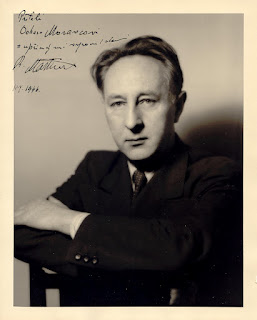Information
Composer: Bohuslav Martinů
Rudolf Firkušný, piano
Date: 1989/2019
Label: RCA
- (01) Les Ritournelles, H. 227
- (07) Fantasie and Toccata, H. 281
- (09) Piano Sonata No. 1, H. 350
- (12) Julietta, H. 253: Act II, Scene 3: Moderato
- (13) Etudes and Polkas, H. 308
Rudolf Firkušný, piano
Date: 1989/2019
Label: RCA
----------------------------------------------------------------------------
Martinu's piano music is rarely heard in recitals and none of it is represented in the domestic catalogue at present. Up to a point, I suppose, this is understandable: on paper it must often look like an alternation of bafflingly plain, even empty pages with others filled to bursting with almost machine-like, pre-minimalist toccata figures. In performance it is nothing at all like that, as Firkusny demonstrates. The toccata figures are often a metaphor for sheer exuberance, as in one or two of the Etudes, where (they alternate with overtly Czech and infectiously high-spirited Polkas) Martinu's happiness at the end of the Second World War and the prospect (vain, alas) of returning to Czechoslovakia is clearly expressed. But in a work like the Fantasie a Toccata (both sections are complex fantasies, both are toccatas) the energy is feverish, disturbed, anxious, and it is no surprise to learn from Firkusny's affectionate note accompanying this recording that the work was written while he and the composer were trying to escape from occupied France in 1940.
The barer pages spring to life in performances like Chinese flowers dropped into water. One of Martinu's most characteristic voices, perhaps his very essence, is a music of intensely pure lyricism made from astonishingly few notes. It is heard at its lightest and most ingratiating in Les ritournelles, a sequence of slight but charming lyrical studies; it emerges momentarily and hauntedly amidst the turbulence of the Fantasie a Toccata; the Etudes and Polkas reveal it to be rooted in memories of Czech folk-music. Rooted, but not really derived: the brief scene from Julietta (Firkusny's own transcription, he often played it to Martinu when they were newly arrived exiles in New York) is saturated in that lyricism, but one would not describe the piece' as 'folksy', nor as simple; it has a passionate eloquence.
Both manners are present in the Sonata, Martinu's last keyboard work, the lyricism exquisitely delicate, the motoric elements achieving a grand almost Beethovenian rhetoric in the finale. Firkusny's performances are revelatory, not only of the stature of this music and his love for it, but of a deeply musical pianism (he studied with Schnabel … and Janacek), the clarity of his left-hand technique, in particular, is a marvel. The recording is all that one could wish for.
-- Michael Oliver, Gramophone [12/1989]
The barer pages spring to life in performances like Chinese flowers dropped into water. One of Martinu's most characteristic voices, perhaps his very essence, is a music of intensely pure lyricism made from astonishingly few notes. It is heard at its lightest and most ingratiating in Les ritournelles, a sequence of slight but charming lyrical studies; it emerges momentarily and hauntedly amidst the turbulence of the Fantasie a Toccata; the Etudes and Polkas reveal it to be rooted in memories of Czech folk-music. Rooted, but not really derived: the brief scene from Julietta (Firkusny's own transcription, he often played it to Martinu when they were newly arrived exiles in New York) is saturated in that lyricism, but one would not describe the piece' as 'folksy', nor as simple; it has a passionate eloquence.
Both manners are present in the Sonata, Martinu's last keyboard work, the lyricism exquisitely delicate, the motoric elements achieving a grand almost Beethovenian rhetoric in the finale. Firkusny's performances are revelatory, not only of the stature of this music and his love for it, but of a deeply musical pianism (he studied with Schnabel … and Janacek), the clarity of his left-hand technique, in particular, is a marvel. The recording is all that one could wish for.
-- Michael Oliver, Gramophone [12/1989]
----------------------------------------------------------------------------

Bohuslav Martinů (December 8, 1890 – August 28, 1959) was a Czech composer of modern classical music. Martinů began as a violinist of the Czech Philharmonic Orchestra. In the early 1930s he found his main font for compositional style, the neo-classical as developed by Stravinsky. With this, he expanded to become a prolific composer, who wrote almost 400 pieces, included 6 symphonies, 15 operas, 14 ballet scores and a large body of orchestral, chamber, vocal and instrumental works. He is compared with Prokofiev and Bartók in his innovative incorporation of Central European ethnomusicology into his music.
http://en.wikipedia.org/wiki/Bohuslav_Martin%C5%AF
http://en.wikipedia.org/wiki/Bohuslav_Martin%C5%AF
***
Rudolf Firkušný (11 February 1912 – 19 July 1994) was a Czech-born, Czech-American classical pianist. Firkušný started his musical studies with the composers Leoš Janáček and Josef Suk, and the pianist Vilém Kurz. Later he studied with the legendary pianists Alfred Cortot and Artur Schnabel. Firkušný had a broad repertoire but became known especially for his performances of the Czech composers Bedřich Smetana, Antonín Dvořák, Janáček, and Bohuslav Martinů (who wrote a number of works for him). He was also a devoted chamber player, and gave many first performances of contemporary composers.
----------------------------------------------------------------------------
FLAC, tracks
Links in comment
Enjoy!


This comment has been removed by the author.
ReplyDeleteWould you mind re-uploading this recording?
ReplyDeleteChoose one link, copy and paste it to your browser's address bar, wait a few seconds (you may need to click 'Continue' first), then click 'Skip Ad' (or 'Get link').
ReplyDeleteIf you are asked to download or install anything, IGNORE, only download from file hosting site (mega.nz).
If MEGA shows 'Bandwidth Limit Exceeded' message, try to create a free account.
http://usheethe.com/3Dfb
or
https://uii.io/KIULV
or
https://exe.io/DXMAD